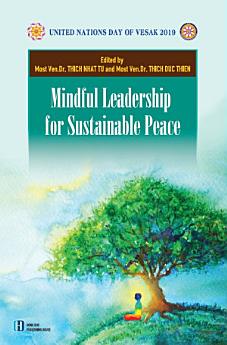Mindful leadership for sustainable peace
এই ইবুকখনৰ বিষয়ে
BACKGROUND
We are experiencing an unprecedented period where wide ranging and disruptive major global change is taking place around us. In this context, the theme of Mindful Leadership and Sustainable Development provides a point of reference and pathway for understanding the contemporary chaotic situations. These disruptive changes challenge our understanding and meaning of humanity and truly question whether or not, we are able to live in a society where justice, equality, peace, and prosperity abound.
In the Buddhist light, a focus is placed on understanding the Buddhist teachings to develop solutions for dealing with these wide-ranging problems. Both the scope of change and the response from a Buddhist approach are core to the content of this volume. It is of paramount importance that any investigation and development of solutions for the changes taking place, require guidance from the Buddhist philosophy. As a starting point for discussion, an initial focus is placed on providing a thorough and critical understanding of the character and context of change. In doing so, we also seek to clarify and outline the nature of a Buddhist approach. In completing this review, it is productive to see that given the complex issues being dealt with, the papers do generate different frameworks and viewpoints within the broad term of “approach.” The frameworks based on the Buddha´s teachings are not fully fixed and agreed upon by all. Therefore, our term “approach” refers to a set of arrangements and viewpoints that act to inspire further discussion and development.
Given the above context, this volume is a collection of conference papers presented and published for the panel on the first sub-theme of UNDV 2019 on Mindful Leadership for Sustainable Peace on 13 May 2019 at the Tam Chuc International Convention Center, Ha Nam, Vietnam. The panel commemorates the occasion of the 16th United Nations Day of Vesak Celebrations 2019. Through the contributions of participants and their papers at this workshop, this volume provides a diverse and rich range of thinking and wisdom rather than more traditional mainstream thinking or conventional wisdom. Treating the Buddha’s teachings as a basic theoretical reconstruction, we examine the relationships between societies and Buddhism. We combine the analyses of the conflicts, trends and dynamics affecting future global development with focused studies on a range of policy areas for improving societies.
In the Buddhist light, our two most crucial aims in this period of disruption are to greatly increase the influence and impact of Buddhism as our foremost duty; and that the Buddhist responsibility contributes to creating a new foundation for Mindful
Leadership and Sustainable Development.
মূল্যাংকন আৰু পৰ্যালোচনাসমূহ
লিখকৰ বিষয়ে
Most Ven. Dr. Thich Duc Thien obtained his Ph.D. in Buddhist Studies from Delhi University in 2005, currently is Vice President-Secretary General of Executive Council of National Vietnam Buddhist Sangha (VBS); Vice Chairman of Vietnam – India Friendship Association; Head of the Department of International Buddhist Affairs of VBS; Vice Rector of Vietnam Buddhist University in Hanoi; and Senior Lecturer of Vietnam National University, Hanoi (Tran Nhan Tong Academic Institute).
He served as Secretary General of the 2014 United Nations Day of Vesak in Vietnam and continues to hold a major role in UNDV 2019. He has published, edited, and translated many books in Buddhist studies and history. He has received many prestigious recognitions from the Government of Vietnam (the Third-Class Labor Order), from the Royalty of Cambodia (the General Order), and from the Government of India (the Padma Shri Order).
Most Ven. Dr. Thich Nhat Tu obtained his D.Phil., in Philosophy from Allahabad in 2002, is the Founder of Buddhism Today Foundation since 2000. He made valuable contribution as an editorial member of Hue Quang Encyclopedia of Buddhism (9 volumes, 1992-2007). He is editor-in-chief of the first ever audio Vietnamese Tripitaka, of the ongoing Vietnamese Tripitaka Translation project and Buddhism Today Series (over 250 books), as well as editor of more than two 200 CD albums on Buddhist music. He has authored more than 80 Vietnamese books on applied Buddhism. He has traveled extensively around the world to give public Dharma talks to Vietnamese communities in Vietnam, Canada, America, Australia, and Europe and has produced over 4,000 VCDs on various dharma topics.
Master Thich Nhat Tu now serves as Vice Rector of the Vietnam Buddhist University and Vice Chairman of the National Department of International Buddhist Affairs. Several universities conferred upon him the title of Doctor Honoris Causa in appreciation of his excellent contributions to Buddhist education, his works on Buddhist academic research and leadership in international Buddhist communities. He has received many recognitions, awards, and titles from the Government of Vietnam, Myanmar, Thailand, and Cambodia.






